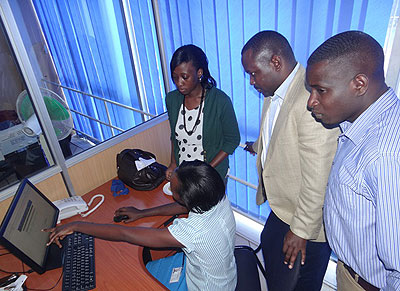Transparency and efficiency in accessing credit across the country could be strengthened thanks to a roll out plan of a new computer soft ware application to monitor performance and data collection across the micro finance sector.


Transparency and efficiency in accessing credit across the country could be strengthened thanks to a roll out plan of a new computer soft ware application to monitor performance and data collection across the micro finance sector.
Performance monitoring soft ware application (PMT) due to be rolled out next month is projected to boost transparency and efficiency within micro finance institutions.
The technology will also aid access to credit by the rural poor and help create a one stop centre for data collection for all the credit institutions at the Association of Micro Finance Institutions of Rwanda (AMIR) head quarters in Kigali.
Supported by the National Bank of Rwanda, Access to Finance Rwanda and Small Enterprise Education and Promotion Network, (SEEP) a US based organisation, the application is expected assist credit institutions technically and financially.
According, Kevin Kavugizo, the Director of Microfinance supervision department at Central Bank, Rwanda’s micro finance industry needs properly packaged data to be able to thrive and drive economic development.
"And if PMT technology can solve the challenge, then Central Bank is fully in support of the initiative. We are confident that the mechanism will give us more accurate data about the missing gaps and how they can be filled for a more robust financial inclusion across the country,” Kavugizo said.
Judith Aguga, the Technical director of Access to Finance Rwanda, said that the institution is funding the activity to tackle the challenge of lack of accurate data on microfinance.
"We are looking forward to building a much stronger microfinance data centre with support from Microfinance Institution Rwanda to streamline the sector and facilitate financial interventions in the sector”.
It is important for any association to have data of its sector and we are encouraging this exercise to promote transparency of microfinance work and social performance related indicators” Said Bintou Ka Niang, the director of the association’s development at SEEP.
The system is already being implemented in the neighbouring countries including Uganda.
Efforts to import the system and train more data analysts are ongoing, Jean Damascene Hakuzimana, the in charge of communication and advocacy at Association of Micro finance Institution Rwanda, said.
Meanwhile, AMIR has submitted a code of conduct to the National Bank of Rwanda for analysis before attracting full support from the bank.
Peter Rwema, the Programmes director, at AMIR, said the code will help the institution align its financial activities with all the stake holders including Central the bank.
The code emphasises the inspection, enforcement and compliance on relevant laws and regulations as stipulated by the central bank; but it also promotes transparency and accountability with intent of instilling a robust governance system in the sector,” Rwema said.
The Micro finance sector has been striving to address the challenges related to clients’ over-indebtedness, lack of transparency, irresponsible pricing, poor customer care and protection, among others.
However, despite the challenges, statistics from the central bank indicate that the sector has put forward a robust performance over the past five years when compared to commercial banks.
Statistics for second quarter of 2014 indicate that Rwanda’s microfinance sector has performed excellently well registering return on asset and return on equity of 0.6%.
Total liquid assets registered under this sector have since increased from Rwf42.08billion in 2013 to more than Rwf43.95billion during first quarter of 2014.
This growth was mainly driven by the liquid assets and gross loans which increased by 27.2% and 24.2%, moving from Rwf33.1billion to Rwf42.1billion and Rwf59.2billion to Rwf73.5billion respectively between 2012 and 2013, according to Dr. Thomas Kigabo chief economist, National Bank of Rwanda.
The Monetary Policy Committee (MPC) and Financial Stability Committee (FSC) at the Central Bank recently resolved to continue strengthening the banks monitoring mechanism as the country’s economy recovers from slow growth registered during 2013.


